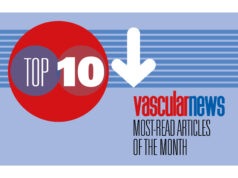Twelve-month results from the VeClose trial have demonstrated cyanoacrylate adhesive (CAE) is non-inferior to radiofrequency ablation (RFA) for the treatment of incompetent great saphenous veins.
Data were presented by Nick Morrison (Morrison Vein Institute, Scottsdale, USA) at the European Venous Forum (2–4 July, Saint Petersburg, Russia).
Morrison told delegates that the randomised multicentre VeClose trial sought to compare a novel treatment modality using cyanoacrylate adhesive (VenaSeal, Medtronic/Covidien) to radiofrequency ablation (ClosureFast) for the treatment of refluxing great saphenous veins of less than 12mm.
The VenaSeal closure system is a minimally invasive, non-tumescent, non-thermal and non-sclerosant procedure that uses an advanced medical adhesive to close the diseased vein in patients with symptomatic venous reflux disease.
Two-hundred and forty two patients were enrolled (CAE; n=108, RFA; n=114), the majority were Caucasian women, Morrison noted. Enrolment was completed in September 2013. The primary endpoint was complete closure of the target great saphenous vein at three months as assessed by duplex ultrasound. Patients were followed-up at three days, one, three, six, 12, 24 and 36 months post-treatment. Patients did not receive adjunctive therapy for three months.
Morrison said that at 12 months closure rates with radiofrequency ablation were 97.1% and 97.2% with CAE by Kaplan-Meier analysis. Periprocedural pain was similar between the groups. At 30 days, 97.2% of patients treated with CAE demonstrated complete occlusion of the target vein compared to 84% of the patients treated with radiofrequency ablation, “this shows complete occlusion earlier with CAE than radiofrequency ablation,” Morrison said. He highlighted that no serious adverse events were related to the devices or procedures.
Concluding Morrison said: “Closure rate of CAE is very high and similar to other current treatment technologies without need for tumescence.” He also noted that the US pivotal FDA VeClose study is ongoing with two-year results currently being collected.













